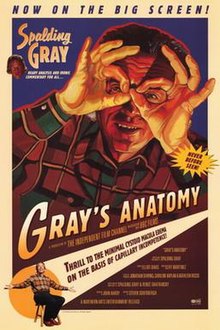
Steven Andrew Soderbergh is an American film director, producer, screenwriter, cinematographer, and editor. A pioneer of modern independent cinema, Soderbergh later drew acclaim for formally inventive films made within the studio system.

Traffic is a 2000 American crime drama film directed by Steven Soderbergh and written by Stephen Gaghan. It explores the illegal drug trade from several perspectives: users, enforcers, politicians, and traffickers. Their stories are edited together throughout the film, although some characters do not meet each other. The film is an adaptation of the 1989 British Channel 4 television series Traffik. The film stars an international ensemble cast, including Don Cheadle, Benicio del Toro, Michael Douglas, Erika Christensen, Luis Guzmán, Dennis Quaid, Catherine Zeta-Jones, Jacob Vargas, Tomas Milian, Topher Grace, James Brolin, Steven Bauer, and Benjamin Bratt. It features both English and Spanish-language dialogue.

Spalding Gray was an American actor, novelist, playwright, screenwriter and performance artist. He is best known for the autobiographical monologues that he wrote and performed for the theater in the 1980s and 1990s, as well as for his film adaptations of these works, beginning in 1987. He wrote and starred in several, working with different directors.

Vitrectomy is a surgery to remove some or all of the vitreous humor from the eye.

Sex, Lies, and Videotape is a 1989 American independent drama film written and directed by Steven Soderbergh. The plot tells the story of a troubled man who videotapes women discussing their sexuality and fantasies, and its impact on the relationships of a troubled married couple and the wife's younger sister.

Schizopolis is a 1996 surrealist experimental comedy film with a non-linear narrative written and directed by Steven Soderbergh.

Spalding Gray: Terrors of Pleasure is a 1987 filming of a monologue written and performed by Spalding Gray. The monologue is composed of material from the original stage performance Swimming to Cambodia that was not used in the 1987 film.

True Stories is a 1986 American satirical musical comedy film directed by David Byrne, who stars alongside John Goodman, Swoosie Kurtz, and Spalding Gray. The majority of the film's music is supplied by Talking Heads. A soundtrack album, titled Sounds from True Stories, featured songs by Byrne, Talking Heads, Terry Allen & The Panhandle Mystery Band, and others. Around the same time, Talking Heads released an album titled True Stories, composed of studio recordings of songs featured in the film.
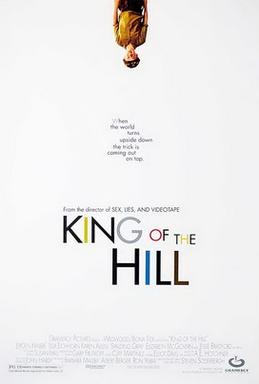
King of the Hill is a 1993 American drama film written and directed by Steven Soderbergh. It is the second he directed from his own screenplay following his 1989 Palme d'Or-winning film Sex, Lies, and Videotape. It too was nominated for the Palme d'Or, at the 1993 Cannes Film Festival.

The Killing Fields is a 1984 British biographical drama film about the Khmer Rouge regime in Cambodia, which is based on the experiences of two journalists: Cambodian Dith Pran and American Sydney Schanberg. It was directed by Roland Joffé and produced by David Puttnam for his company Goldcrest Films. Sam Waterston stars as Schanberg, Haing S. Ngor as Pran, and John Malkovich as Al Rockoff. The adaptation for the screen was written by Bruce Robinson; the musical score was written by Mike Oldfield and orchestrated by David Bedford.
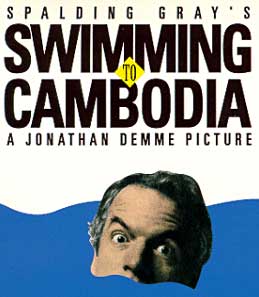
Swimming to Cambodia, also known as Spalding Gray's Swimming to Cambodia, is a 1987 American concert film written by and starring Spalding Gray, and directed by Jonathan Demme. The performance film is of Gray's play and monologue, which centered on such themes as his trip to Southeast Asia to create the role of the U.S. Ambassador's aide in the film The Killing Fields, the Cold War, Cambodia Year Zero, and his search for his "perfect moment". It was nominated for Best Feature, Best Director, Best Actor, and Best Screenplay at the 1988 Independent Spirit Awards.
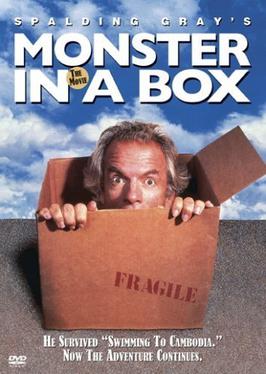
Monster in a Box is a monologue originally performed live on stage by the writer Spalding Gray then subsequently made into a 1992 film starring Gray and directed by Nick Broomfield.
Hitchcockian films are those made by various filmmakers, with the styles and themes similar to those of Alfred Hitchcock.

Epiretinal membrane or macular pucker is a disease of the eye in response to changes in the vitreous humor or more rarely, diabetes. Sometimes, as a result of immune system response to protect the retina, cells converge in the macular area as the vitreous ages and pulls away in posterior vitreous detachment (PVD).
Glenn Kenny is an American film critic and journalist. He writes for The New York Times and RogerEbert.com.
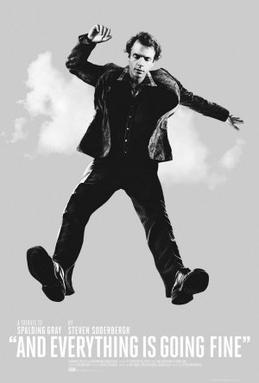
And Everything Is Going Fine is a 2010 documentary film directed by Steven Soderbergh about the life of monologist Spalding Gray. It premiered on January 23, 2010 at the Slamdance Film Festival and was screened at the 2010 SXSW Film Festival and the 2010 Maryland Film Festival. Soderbergh had earlier directed Gray's filmed monologue, Gray's Anatomy.

The Knick is an American medical period drama television series on Cinemax created by Jack Amiel and Michael Begler and directed by Steven Soderbergh. The series follows Dr. John W. Thackery and the staff at a fictionalized version of the Knickerbocker Hospital in New York during the early twentieth century. Amiel and Begler wrote the majority of the episodes and are executive producers. Owen, Soderbergh, Gregory Jacobs, and Michael Sugar were executive producers. Steven Katz was the supervising producer and also writer, Michael Polaire was the producer and David Kirchner the associate producer.
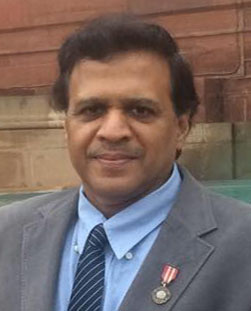
Atul Kumar is an Indian ophthalmologist who is currently the Chief & Professor of Ophthalmology at Dr. Rajendra Prasad Centre for Ophthalmic Sciences (RPC-AIIMS), the national apex ophthalmic centre at All India Institute of Medical Sciences, Delhi. He was awarded the Padma Shri award in January 2007 for his services to the medical field. He specializes in vitreoretinal surgery and also heads the Vitreo-Retinal, Uvea and ROP services at RPC-AIIMS.
Renée Shafransky is an American writer, independent film producer and director, and psychotherapist. She is known for her collaborations with writer/actor/monologist Spalding Gray, and as a founding member of the Collective for Living Cinema. Her novel Tips for Living was published in 2018.
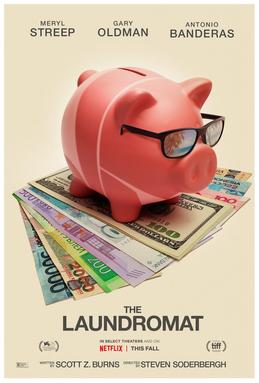
The Laundromat is a 2019 American comedy-drama film directed by Steven Soderbergh with a screenplay by Scott Z. Burns. It is based on the book Secrecy World about the Panama Papers scandal by author Jake Bernstein. The film stars Meryl Streep, Gary Oldman, Antonio Banderas, Robert Patrick, Jeffrey Wright, David Schwimmer, Matthias Schoenaerts, James Cromwell and Sharon Stone.
